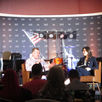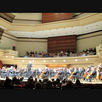DuPage Symphony Orchestra opens its 71st season with Bold Beginnings
- Sep 25, 2024
- 4 min read
DuPage Symphony Orchestra presents the world premiere of The True Awakening to Greatness by student composer Angel Alday at 3 p.m. on Sunday, Oct. 13 at Wentz Concert Hall in Naperville.
Photo: Angel Alday. Photo: Todd Rosenberg Photography.
“Whatever you can do, or dream you can, begin it. Boldness has genius, power, and magic in it,” said German writer and poet Johann Wolfgang von Goethe. I would add to it – boldness is also based in hard work and perseverance. Angel Alday, the First Place Winner of the Illinois Music Education Association's 2023-2024 Student Composition Contest, is a great example of talent, hard work, and boldness.
The DuPage Symphony Orchestra is proud to announce the world premiere performance of The True Awakening to Greatness by Angel Alday. This extraordinary composition will be featured in the orchestra’s season-opening concert, Bold Beginnings, at 3 p.m. on Sunday, October 13 at Wentz Concert Hall in Naperville.
The DuPage Symphony Orchestra’s 2024-25 season is called Bold and Beautiful. Each concert of the season will demonstrate the beauty of various symphonic compositions and the boldness of musicians and composers. Besides presenting Bold Beginnings on October 13, the orchestra will perform Scandinavian Showcase on November 16, Holiday Magic on December 15, Beyond Beautiful on February 16, Young at Heart on March 16, Mexican Montage on May 17, and two free summer concerts.
"We feel honored to perform The True Awakening to Greatness, a deeply moving work from a gifted young composer," said Mari Ullrick, Strategic Director of Operations and Engagement of the DuPage Symphony Orchestra. "This concert marks the beginning of an exciting season for the DSO, and we present this piece as part of our commitment to nurturing and showcasing emerging musical talent."
Alday is an 18-year-old aspiring composer from Chicago. He attended The Chicago High School for the Arts (ChiArts) and started composing late in his sophomore year. Over time, composition became the deepest passion in his musical career. Entering his third year of high school at ChiArts, he was accepted into the ~NOIS Young Creators Fellowship and into the Chicago Symphony Orchestra Young Composer Initiative program with the challenge to compose two works for chamber ensemble. Alday will continue studying composition at the Chicago College of Performing Arts at Roosevelt University.
Alday has already composed three works out of a projected eight that will comprise his The Awakening series: Desperate Awakening, A New Awakening, and The True Awakening to Greatness. Each piece has its own unique melodies, rhythms, harmonies, and instrumentation.
“After all our struggles, the misery, and the fatigue, or even the awakenings we heard, we have finally found our true and final awakening,” wrote Gary A. Greene, Ph.D. about The Awakening series in his concert notes. Meanwhile, the orchestra’s press release underlines that “with a strong sense of melody and orchestral color, The True Awakening to Greatness evokes both beauty and depth, fitting perfectly into the DSO’s dynamic program.”
The music of Russian composers Borodin and Glazunov fits perfectly in the orchestra’s program as well. And it’s not a surprise. For example, Alexander Borodin (originally a scientist) was one of the Mighty Five, a group of five Russian composers from the 19th century who worked together to create a unique Russian style. They tried to establish a Russian school of composition independent of German and other foreign influences to varying degrees. They were inspired by Russian folk music, the philosophical movement of realism, and the chants of the Ancient Orthodox Church.
The Overture to Prince Igor by Borodin will bring to the DuPage Symphony Orchestra’s concert a spirit of Russia in the 12th century. This opera tells a story that describes the battles of the Prince and the Polovtsi. In 1869, Borodin was encouraged to write an opera about Prince Igor, but his sudden death from heart failure left the work musically complete but unfinished in its orchestration. The opera was completed by Rimsky-Korsakov and Alexander Glazunov.
Glazunov saved the Overture to Prince Igor by writing it down from memory after the composer’s death. The opera premiered in St. Petersburg in 1890. It is mostly known through the extraction of a few set pieces, known collectively as the Polovetsian Dances. The overture is built upon themes from the opera rather than separately composed material.
Besides saving the music of others, Glazunov, of course, composed his own. He is known for his conservative, classic compositions. He studied music first with Balakirev and later with Rimsky-Korsakov. Glazunov wrote his first opera in 1881 at age 16. His second symphony-poem was Stenka Razin, which he wrote in 1885. It was dedicated to the memory of Borodin and was premiered in St. Petersburg later that year. Symphonic poems, in general, are one-movement depictions of an event, an idea, a person, and so forth. In this work, the composer chose to depict 17th-century Russia and political unrest during the reign of Tsar Alexei Mikhailovich. Stepan Razin, known as Stenka Razin, arose as a leader of the Don Cossacks.
Particularly, “the music presents a brief episode just before Razin’s capture,” wrote Greene in his concert notes. “He and his Persian princess mistress are aboard a boat on the Volga. Glazunov places us there by quoting The Song of the Volga Boatmen.”
Borodin's captivatingly dramatic Symphony No. 2 in B minor will conclude this wonderful concert program. It’s also called Bogatyr, or Heroic Symphony. He composed it between 1869 and 1876 and then revised it repeatedly (especially the Scherzo) until his death. It is the first great Russian symphony. “It was edited by Rimsky-Korsakov; and, in fact, the DSO plays from a 2008 edition which is a revision of the Rimsky-Korsakov edition,” wrote Greene. “The work was premiered in St. Petersburg in 1877, followed by London in 1896 and New York City in 1897.”
The opening statement, which begins and ends the first movement (Allegro), is clearly influenced by Russian Orthodox chant. The second movement (Scherzo) shows Borodin’s talent for orchestral color. The third movement (Andante) with its flowing melodies is light, lyrical, and sometimes bold. The Finale (Allegro) is optimistic and sounds like a gigantic celebration.
To summarize Borodin’s legacy, I would like to quote Sir Henry Hadow: "No musician has ever claimed immortality with so slender an offering. Yet if there be immortalities in music, his claim is incontestable."
For tickets, please go to https://www.dupagesymphony.org/ or purchase them at the Wentz Concert Hall box office. Tickets are $10-$43 with choral balcony seats $5-$20.
Natalia Dagenhart


























Comments